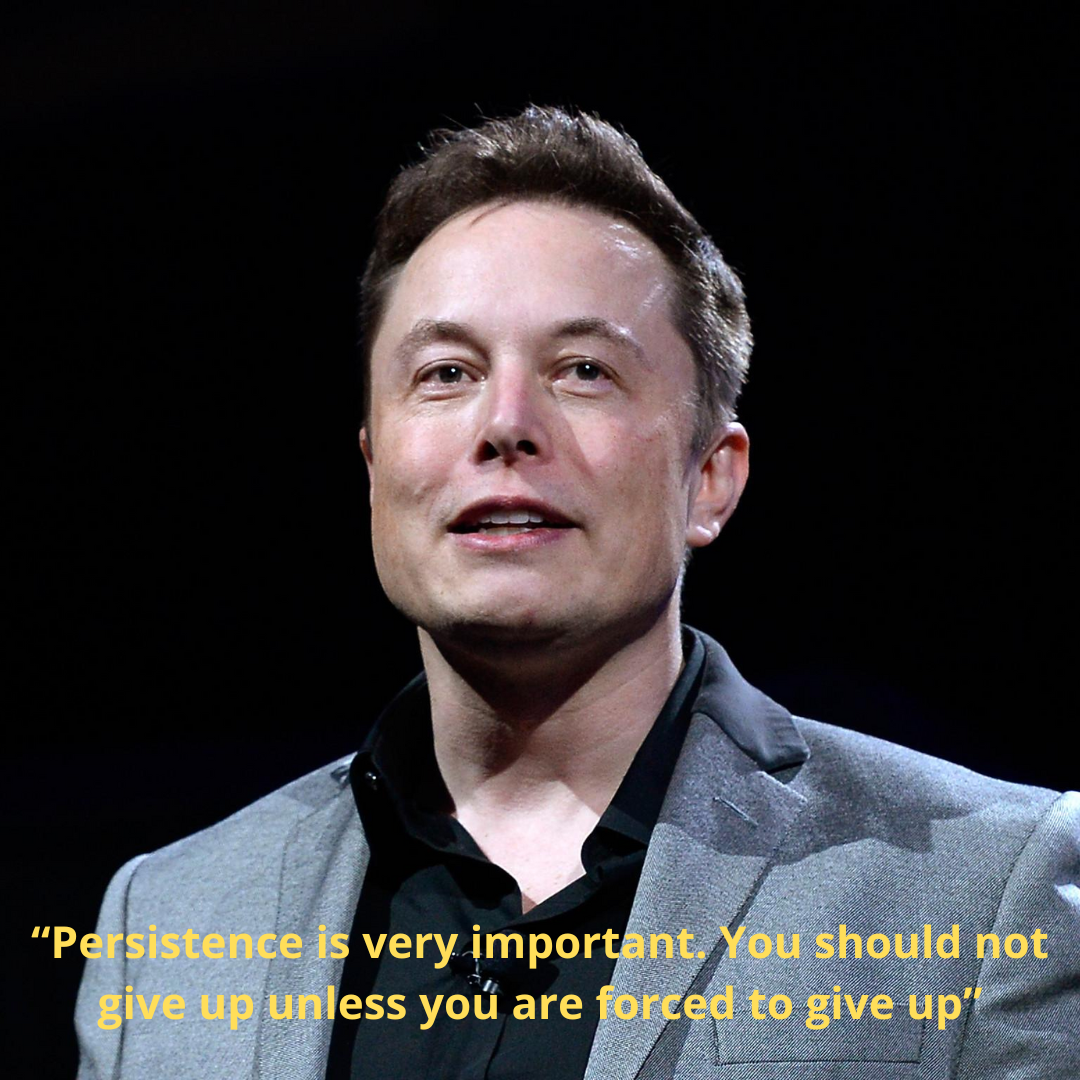Elon Musk is one of the most prominent innovators and industrialists of the 21st century. As the co-founder of PayPal, CEO of Tesla Motors and SpaceX, and driving force behind multiple other technology companies, Elon Musk has cemented himself as a pioneer across industries.
Musk was born in South Africa in 1971. Displaying early interests in computing, he taught himself computer programming by age 12. After leaving South Africa to avoid mandatory military service, he completed undergraduate degrees in economics and physics in Canada and the United States. Musk then deferred graduate studies to launch his first startup in 1995.
With the founding of Zip2, a software company providing business directories and maps, followed by the establishment of X.com, which became PayPal, Musk demonstrated his prowess as an internet entrepreneur. However, his ambitions extended far beyond cyberspace. Musk founded his most prominent ventures, SpaceX and Tesla Motors, in the early 2000s. His goals were uncompromising from the start – to revolutionize space exploration and accelerate the world’s transition to sustainable energy.
Musk is also the co-founder of OpenAI, Neuralink, and The Boring Company. He presently serves as CEO and chief engineer of SpaceX, CEO of Tesla, and founder of Twitter. His distinctive leadership style and sharp business instincts make him one of the most recognizable modern entrepreneurs. However, his demanding nature and blunt delivery also stirs controversies. Regardless, Musk continues to dream big and charge forward with his transformative vision for the future.
Early Life and Education
From an early age, Elon Musk was consumed by a curiosity for understanding how devices and systems worked. Born in Pretoria, South Africa in 1971, Musk displayed strong competencies in computer programming by age 12. He even created and sold a commercial video game called Blastar at only age 12.
Musk read extensively during his childhood on topics ranging from classic literature to quantum physics. He hoped to find answers to humanity’s pressing challenges like sustainable energy and space exploration through science and technology.
After graduating early from Pretoria Boys High School, Musk left South Africa in 1988 on a quest for greater opportunities. His ultimate dream was pursuing innovations to help shape the future. Musk enrolled at Queen’s University in Ontario, Canada, transferring to the University of Pennsylvania two years later.
At Penn, Musk pursued joint degrees in physics and economics. He graduated in 1997, but elected not to pursue further graduate studies in favor of launching an internet startup right away. This represented Musk’s first pivotal career decision veering away from academia to follow his entrepreneurial drive.
Founding of Zip2 and X.com
In 1995, Elon Musk founded his first company, Zip2 Corporation, with his brother Kimbal. Zip2 provided an online business directory combining maps, yellow pages and content, catering primarily to the newly emerging newspaper industry. Musk personally developed some of the software including areas like Internet maps.
As CEO, Musk raised funding, managed day-to-day operations, and shaped the technology and business strategy. With minimal resources, he worked tirelessly to get Zip2 off the ground before the dot-com boom. Musk even once said he worked so much that he resorted to sleeping underneath his desk rather than going home.
Zip2 soon attracted major media companies like Hearst and New York Times as clients. In 1999, Computer maker Compaq acquired Zip2 for $307 million cash, earning Musk $22 million for his 7% share.
Rather than rest or retire, Musk chose to reinvest his earnings into another early-stage internet company. This represented Musk decisively choosing startup life over settling down after his first major exit.
In March 1999, Elon Musk co-founded X.com, one of the first online financial services companies aiming to revolutionize banking. X.com merged with a competitor called Confinity in 2000, which had an online payment service called PayPal. Musk was named CEO of PayPal in early 2000 as it quickly became the payment platform of choice globally for eBay power users.
In 2002, eBay acquired PayPal for $1.5 billion with Musk being the majority shareholder. At age 31, he netted $180 million from PayPal’s sale cementing him as a mid-career internet rockstar worth hundreds of millions. Rather than sit back, Musk was just getting started on his larger ambitions.
Establishment of SpaceX and Tesla Motors
Fresh off the sale of PayPal in 2002, Elon Musk turned his sights to his longstanding passion – space exploration. He started Space Exploration Technologies (SpaceX) in June 2002. The goal was reducing the prohibitive cost barriers hindering advances in space travel and enabling the future colonization of Mars.
Musk invested $100 million of his personal fortune into SpaceX’s founding both as seed money and a reflection of his steadfast commitment despite the risky nature of private space business ventures then. Among various satellite launches, SpaceX’s standout achievements include being the first private company to successfully launch and return a spacecraft from orbit and send astronauts to the International Space Station.
In 2020, SpaceX launched Falcon 9, carrying two NASA astronauts aboard a Dragon capsule to the space station – an industry first heralding the new era of commercial space travel and exploration. SpaceX continues to design larger rockets like Starship with sights set on deeper space missions.
Around the same time in 2003, Musk seeded another central ambition – accelerating mass adoption of sustainable energy. He invested heavily in Tesla Motors co-founded by Martin Eberhard and Marc Tarpenning who wished to commercialize electric vehicles. Musk took an active leadership role from the start, even helping build Tesla’s first car prototype.
As Chairman then eventually CEO, Musk has led Tesla’s stratospheric rise to become the world’s most valuable automaker, surpassing long established titans like GM and Ford. Under Musk’s leadership, Tesla exclusively shifted focus to electric vehicles anchored around innovations like long-range batteries. By making high-performance electric vehicles aspirational through scintillating design and technology, Tesla has convinced mainstream buyers to go electric.
In 2015, Tesla debuted the Model X luxury SUV followed by its first mass-market sedan, the Model 3 in 2017 with 220,000 preorders representing the future of mobility. As the world rapidly adopts clean transport and energy, Musk’s Tesla aims to supply the vehicles, batteries, solar panels, and infrastructure underlying sustainable transformations.
Other Ventures and Notable Achievements
In addition to SpaceX and Tesla, Elon Musk has spearheaded several other highly ambitious technology companies aligned with his vision for improving human development.
In 2015, Musk co-founded OpenAI, a non-profit artificial intelligence research company aiming to responsibly advance AI for the collective human good. The same year, Musk published a white paper outlining his vision for Hyperloop, an ultra high-speed ground transportation system in which pressurized passenger pods glide through low-pressure tubes at airline speeds. The futuristic concept could potentially ferry people between cities faster than air travel.
Musk also co-founded Neuralink in 2016 to integrate the human brain with AI through an implantable “neural lace” brain-machine interface. The technology could help paraplegics walk again or even allow telepathy. Most recently in 2016, Musk founded The Boring Company which constructs underground tunnels to house Hyperloop tracks or just alleviate traffic congestion in growing cities.
In addition to helming cutting-edge companies of the future, Musk holds numerous advisory and leadership positions with a focus on science and technology. He serves on the boards of trustees for the X Prize Foundation, Planetary Society, and California Institute of Technology where he previously studied.
Musk has additionally earned numerous accolades for his boundary-pushing innovations across fields. TIME Magazine named him one of the 100 Most Influential People in the World in 2010 and 2021. Forbes ranked Musk #1 on the Forbes 400 wealthiest Americans list in 2021 with a net worth of almost $300 billion.
Leadership Style and Controversies
Elon Musk has gained repute not just for his groundbreaking companies but also his unorthodox leadership style and controversial public statements. His gritty work ethic is anchored in first principles thinking. Musk burrows into the root details of rocket engines, car batteries, artificial intelligence himself rather than relying on others.
Musk sets hugely ambitious targets for teams which they somehow achieve through his unique brand of inspiration, criticism and urgency. However, Musk demands extreme dedication with workweeks stretching over 100 hours. He casts overly simplifies technical decisions as right or wrong, showing little patience when original timelines slip. His blunt delivery and public complaints about teams prompt turnover at senior levels.
Musk stirs controversies outside office too through unrestrained tweets like calling cave rescuers “pedophiles” or downplaying pandemic dangers. He shows disdain for media critics and regulators attempting to hold him accountable, rather viewing himself as an iconoclast fighting stagnation.
Musk’s supporters overlook his rough edges, instead valorizing his visionary leadership in steering humankind toward sustainable energy use while rekindling excitement for space exploration last witnessed during the Apollo 11 moon landing. His grassroots following even inspired the Tony Stark-esque nickname “Real Life Iron Man”, though Musk once executed an actual Facebook merger in the Iron Man sequel!
Through combinations of self-belief and smart brinksmanship verging on fatalism, Elon Musk continues to ride seemingly crazy decisions to success after success while pushing boundaries of human achievement. As one of the 21st century’s most audacious entrepreneurs, Musk strives to save humanity along the way by solving practical environmental and existential challenges one moonshot venture at a time.
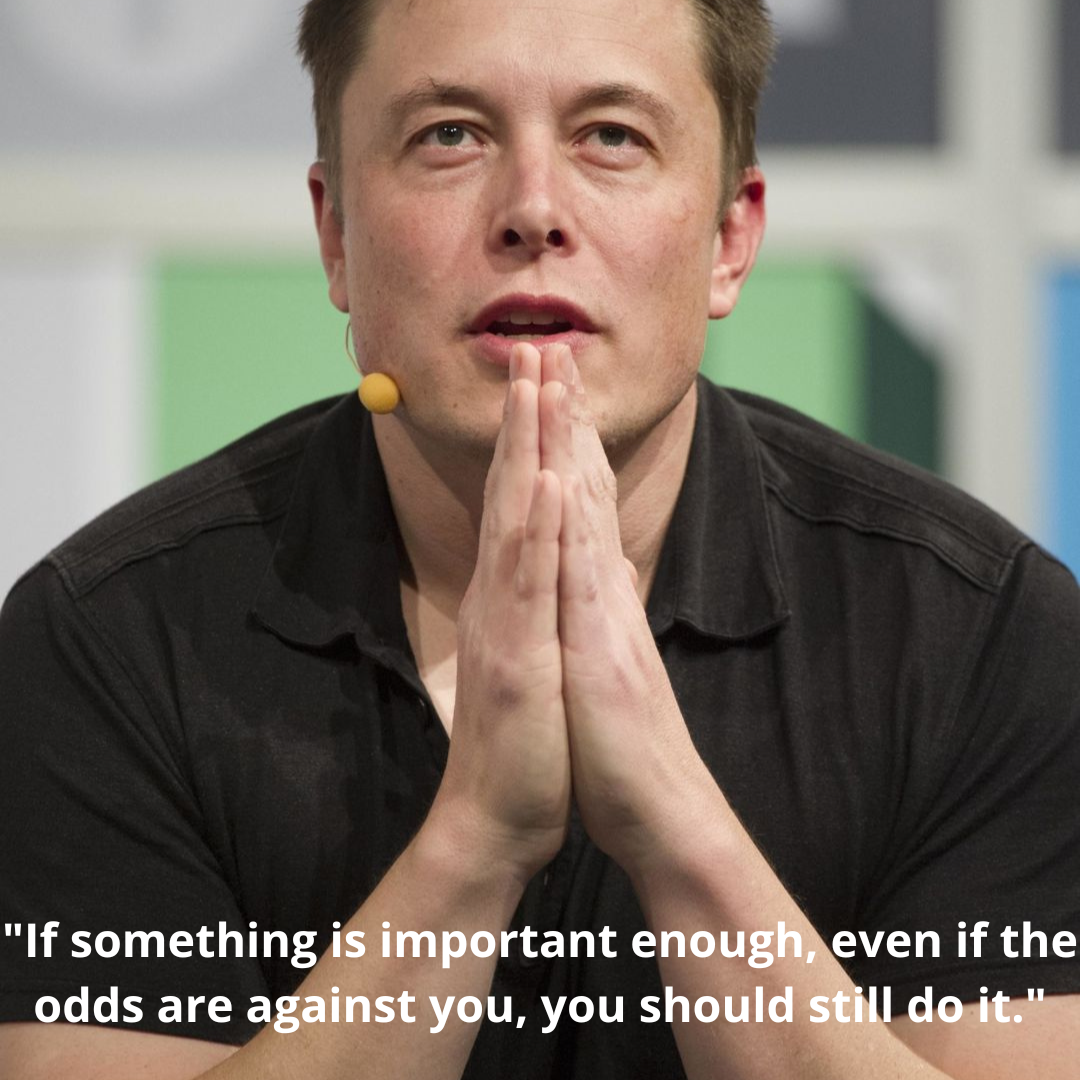
“If something is important enough, even if the odds are against you, you should still do it.”
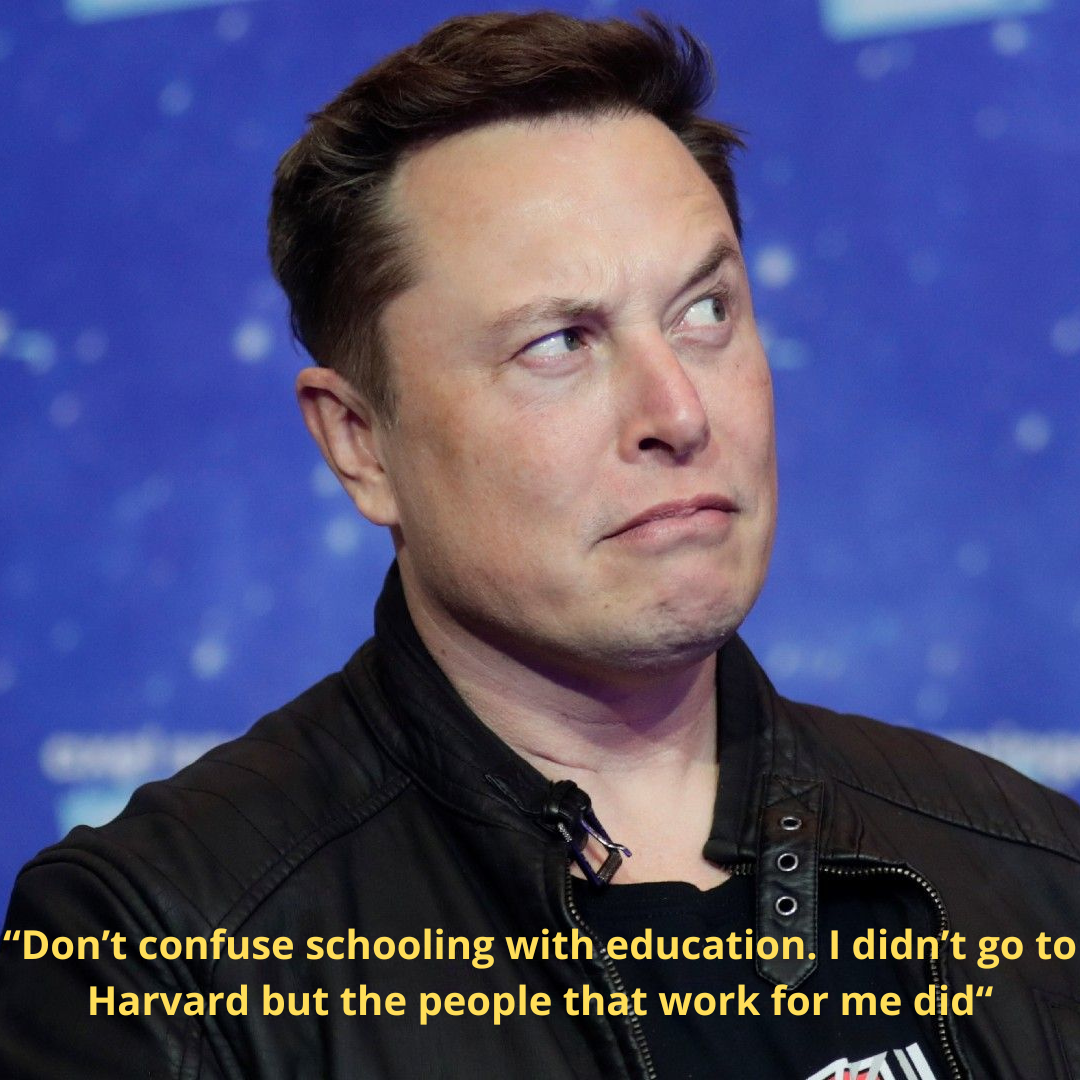
“Don’t confuse schooling with education. I didn’t go to Harvard but the people that work for me did“
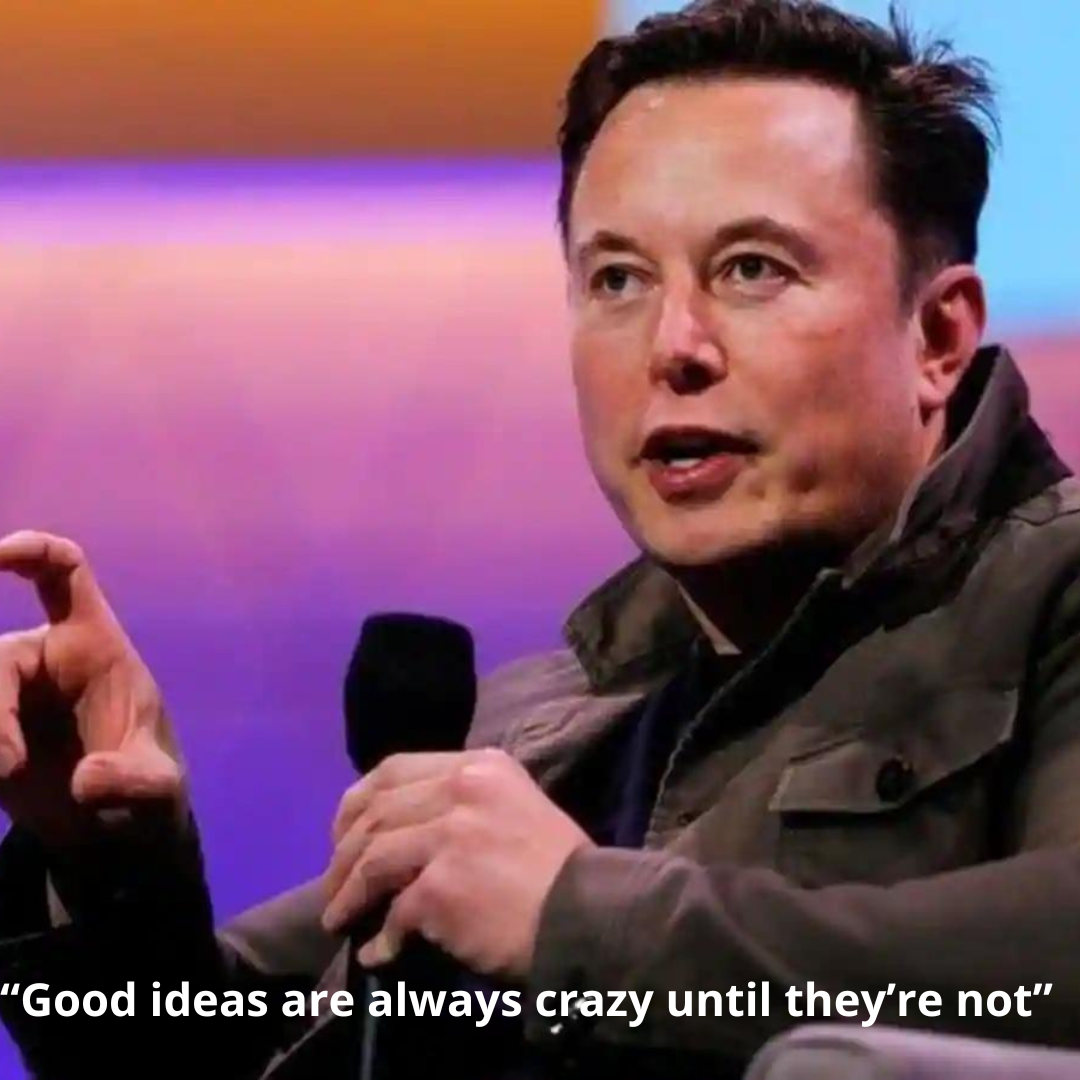
“Good ideas are always crazy until they’re not”
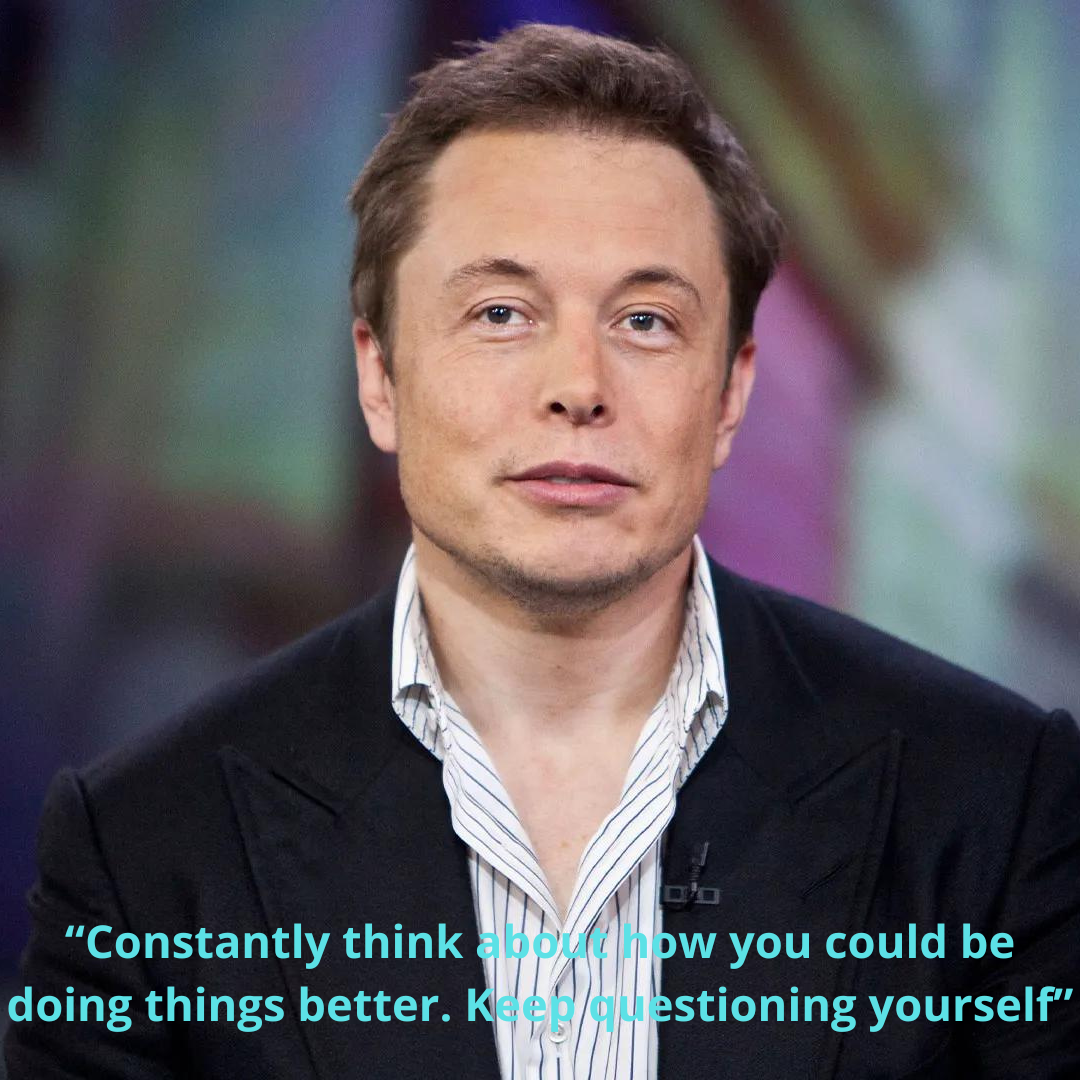
“Constantly think about how you could be doing things better. Keep questioning yourself”
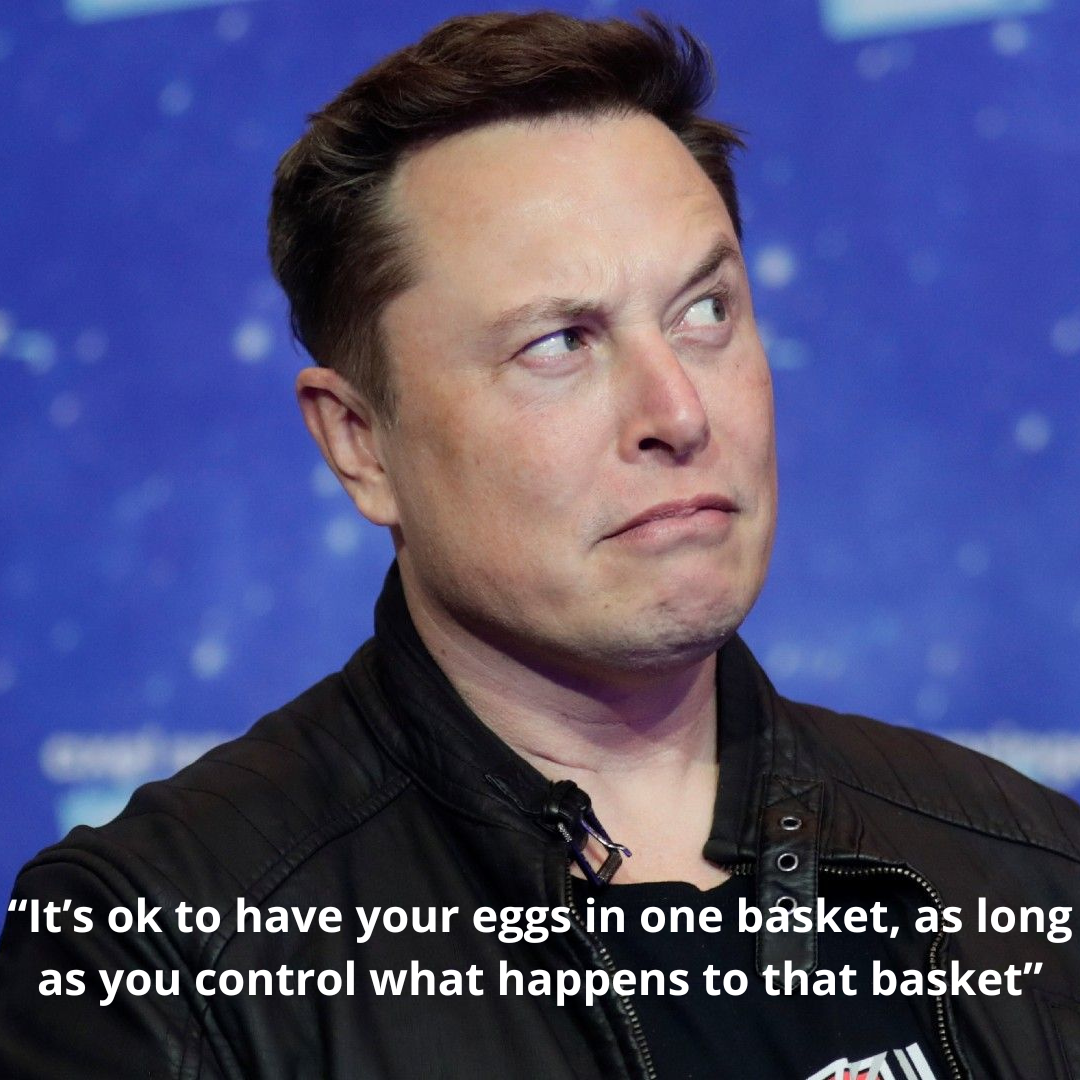
“It’s ok to have your eggs in one basket, as long as you control what happens to that basket”
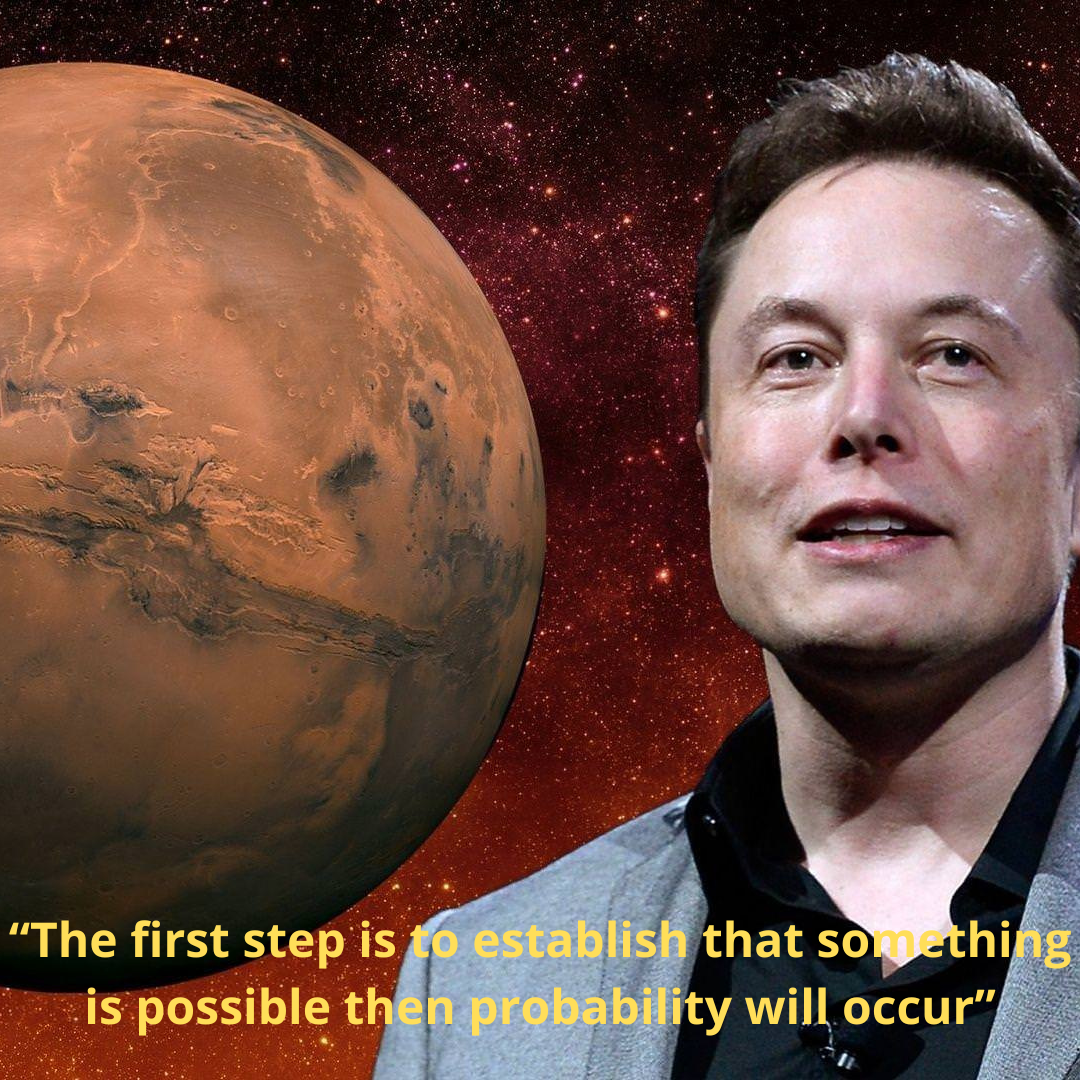
“The first step is to establish that something is possible then probability will occur”
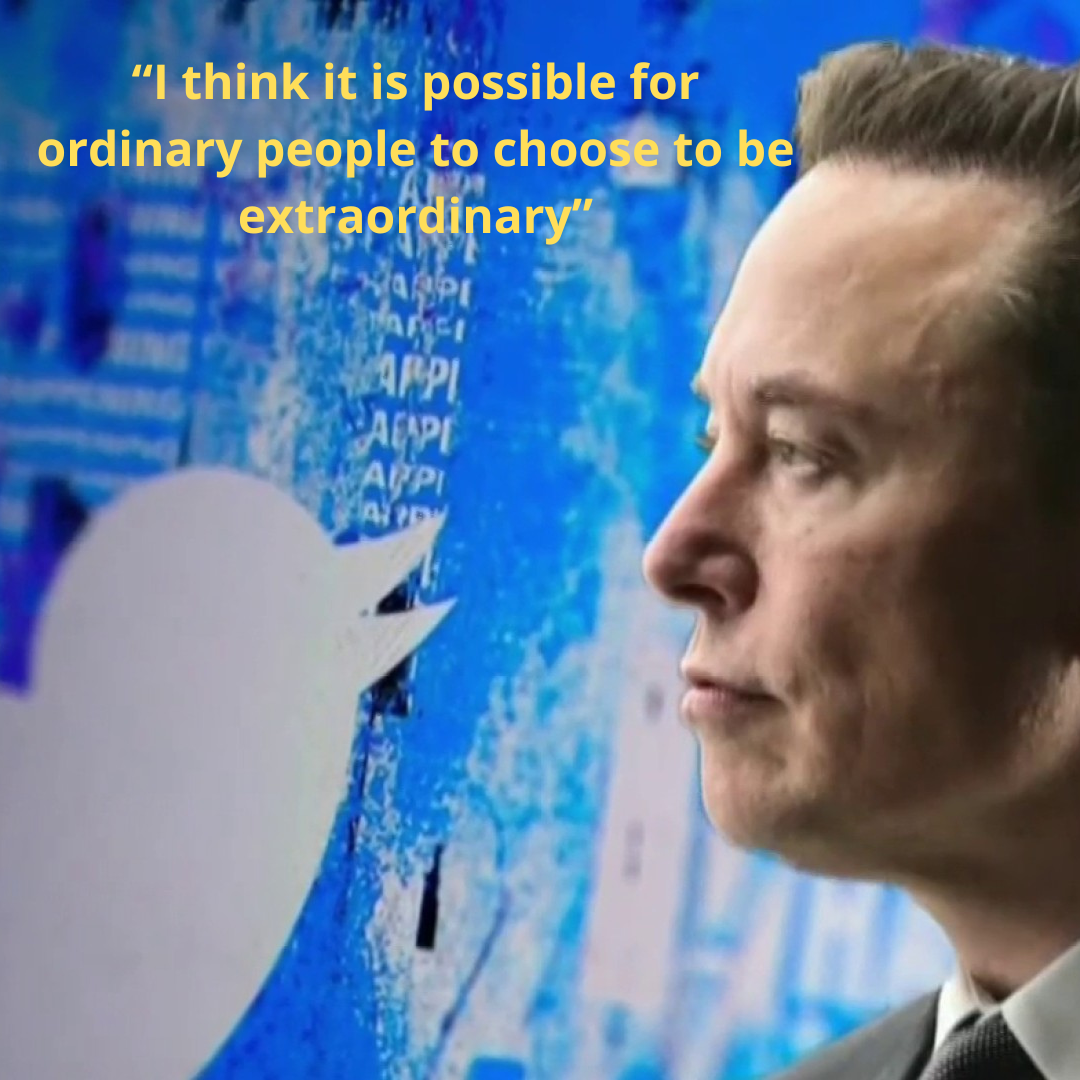
“I think it is possible for ordinary people to choose to be extraordinary”
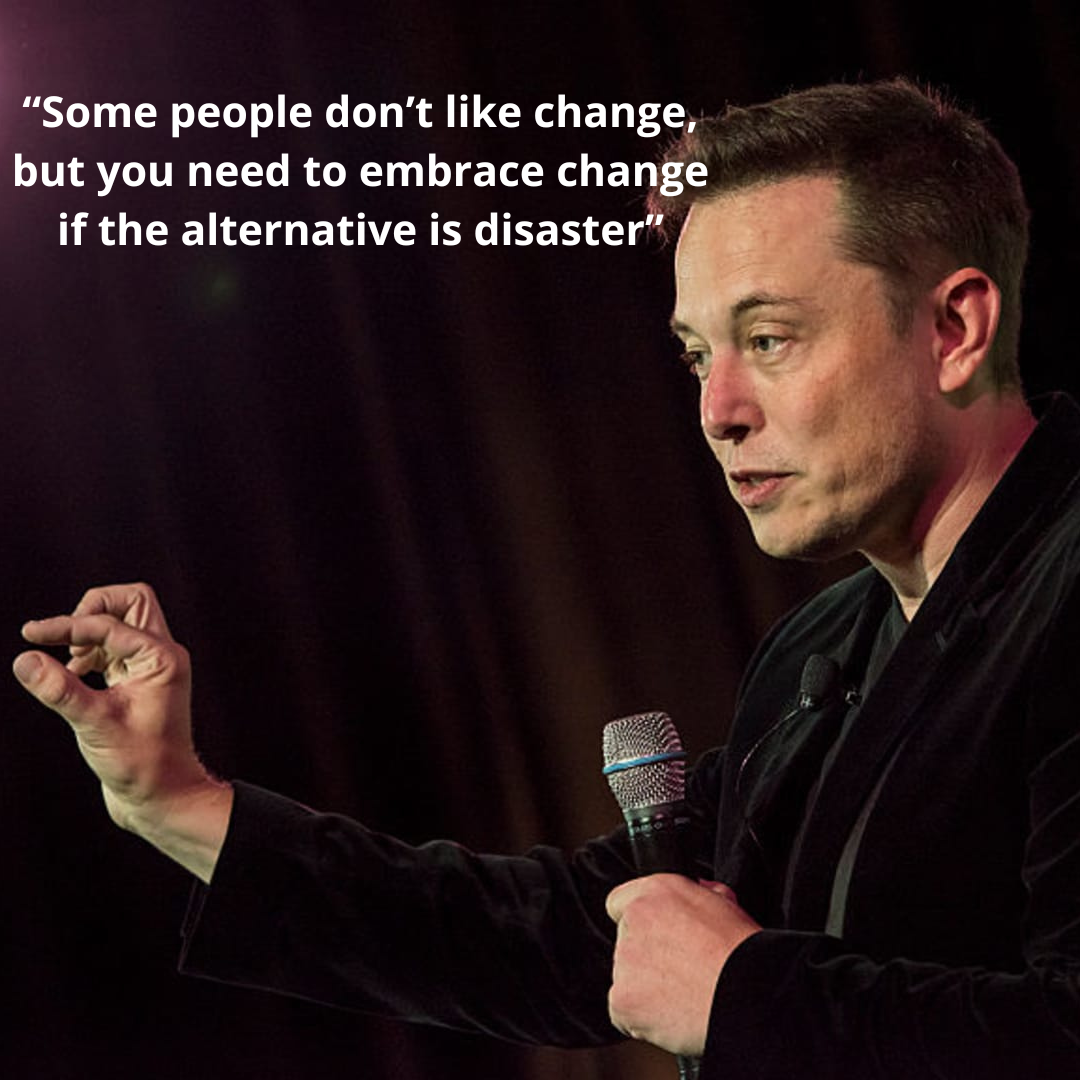
“Some people don’t like change, but you need to embrace change if the alternative is disaster”
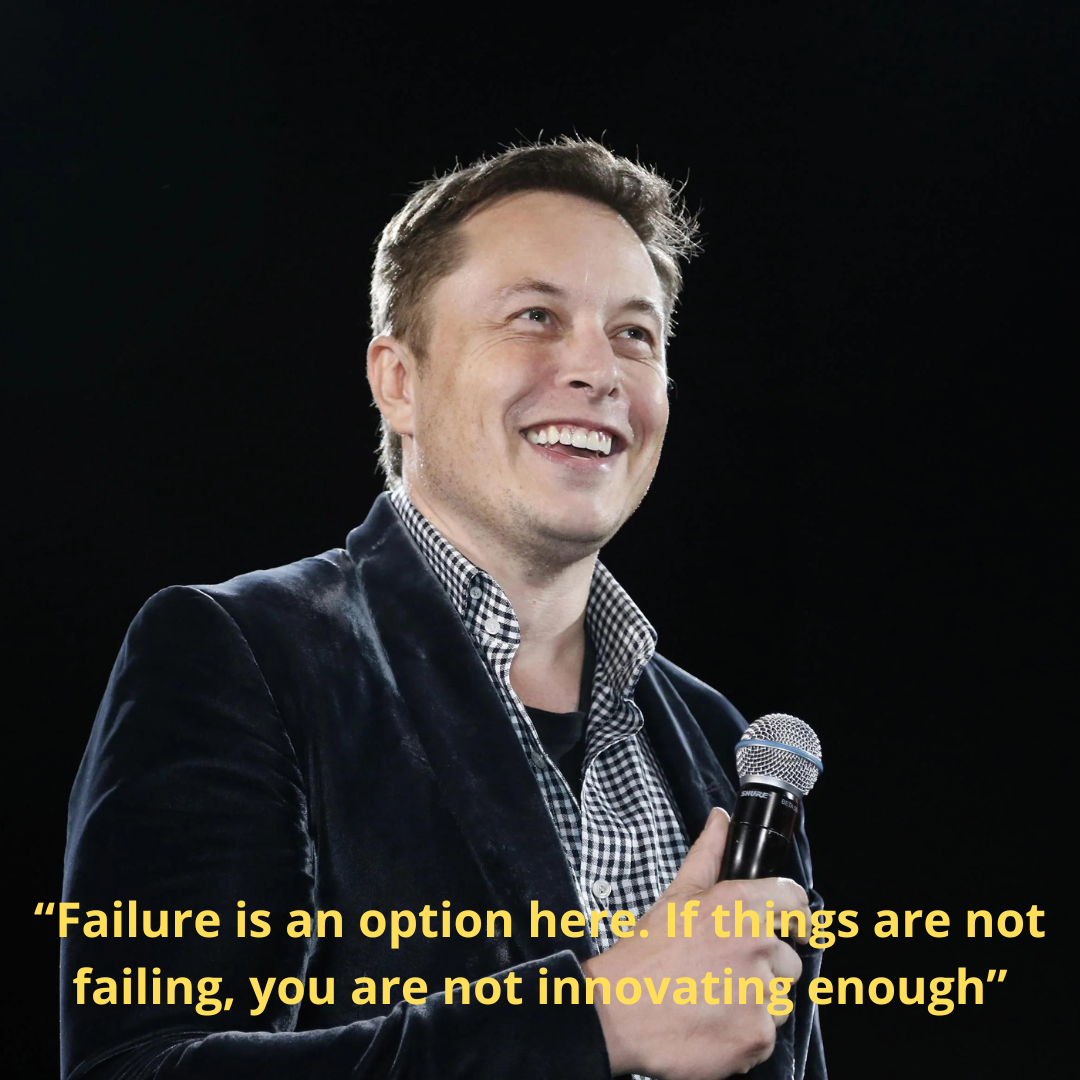
“Failure is an option here. If things are not failing, you are not innovating enough”
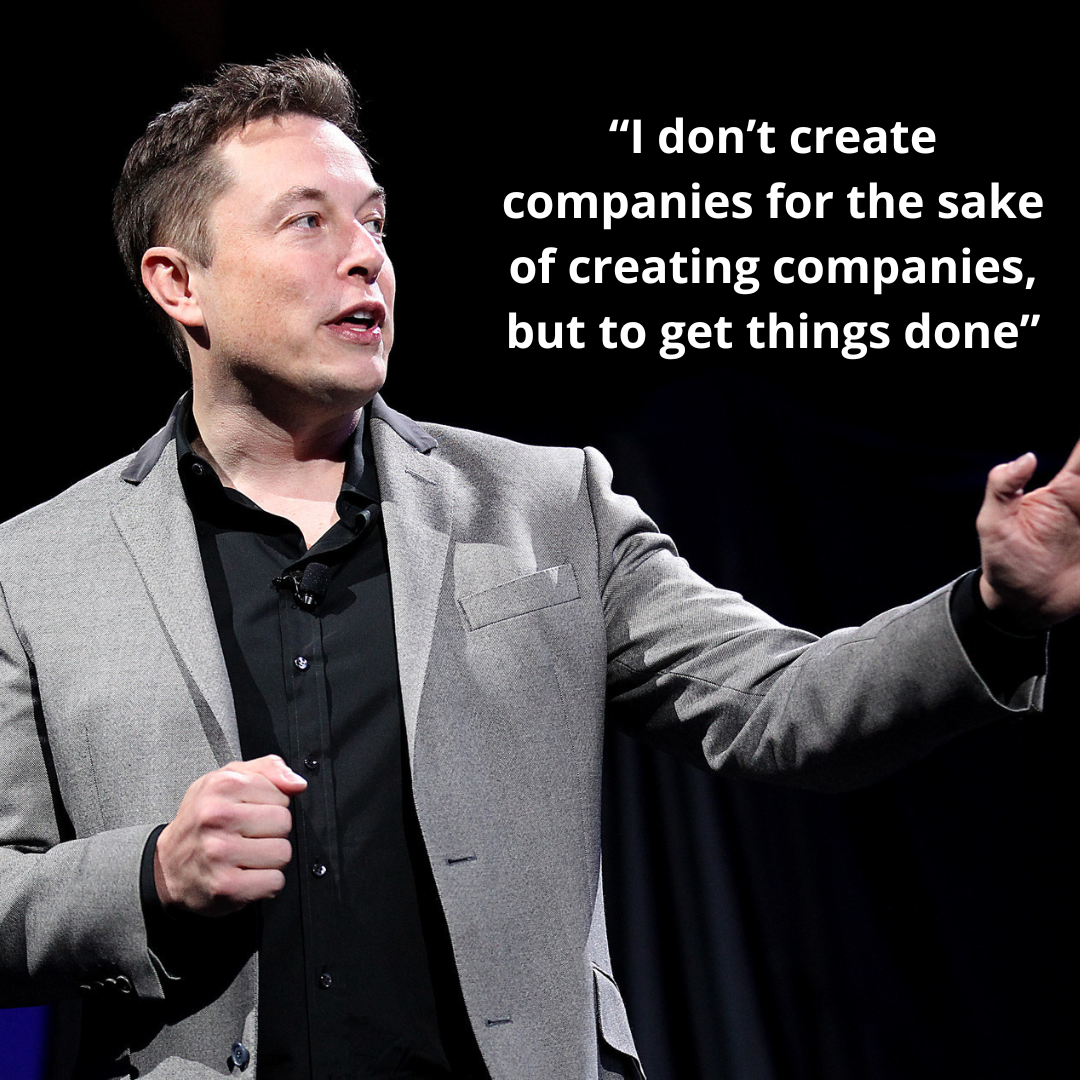
“I don’t create companies for the sake of creating companies, but to get things done”
| Quote |
|---|
| 1. “You shouldn’t do things differently just because they’re different. They need to be… better.” |
| 2. “When something is important enough, you do it even if the odds are not in your favor.” |
| 3. “Talent is extremely important. It’s like a sports team, the team that has the best individual player will often win, but then there’s a multiplier from how those players work together and the strategy they employ.” |
| 4. “Some people don’t like change, but you need to embrace change if the alternative is a disaster.” |
| 5. “I don’t think it’s a good idea to plan to sell a company.” |
| 6. “Failure is an option here. If things are not failing, you are not innovating enough.” |
| 7. “We have a strict ‘no-assholes policy’ at SpaceX.” |
| 8. “The path to the CEO’s office should not be through the CFO’s office, and it should not be through the marketing department. It needs to be through engineering and design.” |
| 9. “Really pay attention to negative feedback and solicit it, particularly from friends. … Hardly anyone does that, and it’s incredibly helpful.” |
| 10. “Persistence is very important. You should not give up unless you are forced to give up.” |
| 11. “I think it’s very important to have a feedback loop, where you’re constantly thinking about what you’ve done and how you could be doing it better.” |
| 12. “If you’re co-founder or CEO, you have to do all kinds of tasks you might not want to do… If you don’t do your chores, the company won’t succeed… No task is too menial.” |
| 13. “There’s a tremendous bias against taking risks. Everyone is trying to optimize their ass-covering.” |
| 14. “Don’t delude yourself into thinking something’s working when it’s not, or you’re gonna get fixated on a bad solution.” |
| 15. “It’s OK to have your eggs in one basket as long as you control what happens to that basket.” |
| 16. “Being an entrepreneur is like eating glass and staring into the abyss of death.” |
| 17. “Brand is just a perception, and perception will match reality over time. Sometimes it will be ahead, other times it will be behind. But brand is simply a collective impression some have about a product.” |
| 18. “I always invest my own money in the companies that I create. I don’t believe in the whole thing of just using other people’s money. I don’t think that’s right. I’m not going to ask other people to invest in something if I’m not prepared to do so myself.” |
| 19. “It is a mistake to hire huge numbers of people to get a complicated job done. Numbers will never compensate for talent in getting the right answer (two people who don’t know something are no better than one), will tend to slow down progress, and will make the task incredibly expensive.” |
| 20. “I think we have a duty to maintain the light of consciousness to make sure it continues into the future.” |
| 21. “Starting and growing a business is as much about the innovation, drive, and determination of the people behind it as the product they sell.” |
| 22. “A company is a group organized to create a product or service, and it is only as good as its people and how excited they are about creating. I do want to recognize a ton of super-talented people. I just happen to be the face of the companies.” |
| 23. “You have to say, ‘Well, why did it succeed where others did not?’” |
| 24. “People work better when they know what the goal is and why. It is important that people look forward to coming to work in the morning and enjoy working.” |
| 25. “Work like hell. I mean you just have to put in 80 to 100 hour weeks every week. [This] improves the odds of success. If other people are putting in 40 hour workweeks and you’re putting in 100 hour workweeks, then even if you’re doing the same thing, you know that you will achieve in four months what it takes them a year to achieve.” |
| 26. “I say something, and then it usually happens. Maybe not on schedule, but it usually happens.” |
| 27. “I always have optimism, but I’m realistic. It was not with the expectation of great success that I started Tesla or SpaceX… It’s just that I thought they were important enough to do anyway.” |
| 28. “I do think there is a lot of potential if you have a compelling product and people are willing to pay a premium for that. I think that is what Apple has shown. You can buy a much cheaper cell phone or laptop, but Apple’s product is so much better than the alternative, and people are willing to pay that premium.” |
| 29. “If you’re trying to create a company, it’s like baking a cake. You have to have all the ingredients in the right proportion.” |
| 30. “I don’t spend my time pontificating about high-concept things; I spend my time-solving engineering and manufacturing problems.” |
| 31. “My biggest mistake is probably weighing too much on someone’s talent and not someone’s personality. I think it matters whether someone has a good heart.” |
| 32. “I don’t create companies for the sake of creating companies, but to get things done.” |
| 33. “When somebody has a breakthrough innovation, it is rarely one little thing. Very rarely, is it one little thing. It’s usually a whole bunch of things that collectively amount to a huge innovation.” |
| 34. “I don’t believe in the process. In fact, when I interview a potential employee and he or she says that ‘it’s all about the process,’ I see that as a bad sign. The problem is that at a lot of big companies, the process becomes a substitute for thinking. You’re encouraged to behave like a little gear in a complex machine. Frankly, it allows you to keep people who aren’t that smart, who aren’t that creative.” |
| 35. “There are really two things that have to occur in order for new technology to be affordable to the mass market. One is you need economies of scale. The other is you need to iterate on the design. You need to go through a few versions.” |
| 36. “The first step is to establish that something is possible; then probability will occur.” |
| 37. “Brand is just a perception, and perception will match reality over time. Sometimes it will be ahead, other times it will be behind. But a brand is simply a collective impression some have about a product.” |
| 38. “It’s very important to like the people you work with, otherwise life [and] your job is gonna be quite miserable.” |
| 39. “I’m interested in things that change the world or that affect the future and wondrous, new technology where you see it, and you’re like, ‘Wow, how did that even happen? How is that possible?’” |
| 40. “As much as possible, avoid hiring MBAs. MBA programs don’t teach people how to create companies.” |
| 41. “People should pursue what they’re passionate about. That will make them happier than pretty much anything else.” |
| 42. “I think you should always bear in mind that entropy is not on your side.” |
| 43. “If you get up in the morning and think the future is going to be better, it is a bright day. Otherwise, it’s not.” |
| 44. “If something has to be designed and invented, and you have to figure out how to ensure that the value of the thing you create is greater than the cost of the inputs, then that is probably my core skill.” |
| 45. “I wouldn’t say I have a lack of fear. In fact, I’d like my fear emotion to be less because it’s very distracting and fries my nervous system.” |
| 46. “When Henry Ford made cheap, reliable cars, people said, ‘Nah, what’s wrong with a horse?’ That was a huge bet he made, and it worked.” |
| 47. “If humanity doesn’t land on Mars in my lifetime, I would be very disappointed” |
| 48. “I would just question things… It would infuriate my parents… That I wouldn’t just believe them when they said something ’cause I’d ask them why. And then I’d consider whether that response made sense given everything else I knew.” |
| 49. “I’ve actually not read any books on time management.” |
| 50. “A company is a group organized to create a product or service, and it is only as good as its people and how excited they are about creating. I do want to recognize a ton of super-talented people. I just happen to be the face of the companies.” |
| 51. “What makes innovative thinking happen?… I think it’s really a mindset. You have to decide.” |
| 51. “There are really two things that have to occur in order for a new technology to be affordable to the mass market. One is you need economies of scale. The other is you need to iterate on the design. You need to go through a few versions.” |
| 52. “Talent is extremely important. It’s like a sports team, the team that has the best individual player will often win, but then there’s a multiplier from how those players work together and the strategy they employ.” |
| 53. “I think most of the important stuff on the Internet has been built. There will be continued innovation, for sure, but the great problems of the Internet have essentially been solved.” |
| 54. “I think we have a duty to maintain the light of consciousness to make sure it continues into the future.” |
| 55. “I think the best way to attract venture capital is to try and come up with a demonstration of whatever product or service it is and ideally take that as far as you can. Just see if you can sell that to real customers and start generating some momentum. The further along you can get with that, the more likely you are to get funding.” |
| 56. “Disruptive technology where you really have a big technology discontinuity… tends to come from new companies.” |
| 57. “If something has to be designed and invented, and you have to figure out how to ensure that the value of the thing you create is greater than the cost of the inputs, then that is probably my core skill.” |
| 58. “I’d rather be optimistic and wrong than pessimistic and right.” |
| 59. “Life is too short for long-term grudges.” |
| 60. “I would like to die on Mars. Just not on impact.” |

Welcome to our blog! My name is Yuvraj Kore, and I am a blogger who has been exploring the world of blogging since 2017. It all started back in 2014 when I attended a digital marketing program at college and learned about the intriguing world of blogging.
